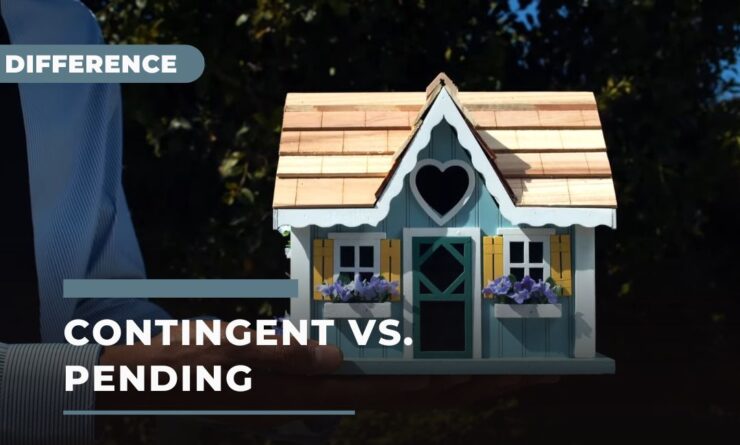When browsing online for a new abode, you might come across property listings marked as “contingent” or “pending”, in addition to the usual “active” and “sold” categories. If a property is tagged as contingent or pending, it signifies that the house is currently under contract.
In other words, the seller has agreed to the buyer’s proposition to buy the house, but there are still some details to iron out before the deal is sealed. So, what’s the distinction between a contingent and a pending status? And do either of these labels imply that the house is off the market?
In this piece, we’ll unravel the nuances between contingent and pending statuses and what they imply for you as a prospective homeowner.
What Does Contingent Signify?
In a broad sense, contingent implies “subject to certain prerequisites being fulfilled.” When applied to real estate, it signifies that the buyer and seller have reached an agreement on the purchase and sale terms, but this agreement is conditional on certain factors.
This is a common scenario in real estate as there are multiple steps between putting a property under contract and finalizing the transaction. For instance, the buyer might need to secure a loan to finance the purchase.
If they fail to obtain the necessary financing, the deal cannot be completed.
Typical Contingencies in Real Estate

Inspection
The inspection contingency permits buyers to hire a professional home inspector to assess the property’s condition. Depending on the contract’s wording, the buyer may have the option to withdraw from the purchase if the home’s condition is unsatisfactory.
Appraisal
The appraisal contingency enables the buyer (or their lender) to engage a licensed home appraiser to evaluate the property’s fair market value. If the appraiser determines the property’s value to be less than the agreed purchase price, the buyer can opt to cancel the purchase, renegotiate the price, or proceed with the understanding that they might be paying more than the property’s worth.
However, if the buyer decides to proceed and is financing a portion of the purchase price, they may need to negotiate with the lender to cover the appraisal gap, ensuring the lender isn’t taking on extra risk by lending on a potentially overpriced property.
Financing
The finance contingency provides the buyer with a timeframe to secure the necessary funds to finalize the deal. It also accounts for the scenario where the buyer might fail to obtain the loan, in which case, the deal cannot proceed.
Title
The title contingency allows the buyer to withdraw from the deal if the property’s ownership is disputed. For instance, if a divorced seller’s ex-partner is still listed as a co-owner on the title, the title company may need to reach out to the co-owner for formal approval of the property sale.
Without this approval, the deal may not be able to close.
When a Buyer Is Selling Their Home
A home sale contingency might be used if a buyer needs to sell their current home to finance the new purchase. This contingency could allow them to postpone or cancel the purchase agreement if they can’t find a buyer for their existing home.
Typical Contingent Statuses
Listings marked as contingent can have various statuses, such as:
Continue-to-Show (CTS)
A listing labeled as continue-to-show (CTS), sometimes referred to as “contingent – continue showing” (CCS), indicates that the property is still actively being marketed. This could suggest that the seller or their agent has doubts about the current contract leading to a successful deal, so they are keeping their options open for a backup offer should the existing agreement fall through.
No Show
A no-show status implies that the seller has chosen not to entertain other offers. This could be because they are confident in resolving the remaining contingencies with the current buyers.
Kick-Out Clause
A kick-out clause stipulates that all contingencies must be resolved by a specific date. If these conditions are not met by the deadline, the existing purchase agreement may be nullified.
What Does Pending Signify?

However, in a broader sense, pending denotes “awaiting resolution.” Therefore, you might encounter instances where the term pending is used loosely to mean “under contract,” irrespective of the status of any contingencies.
Varieties of Pending Statuses
Here are some of the statuses you might encounter for pending listings.
Taking Backups
The term “taking backups” indicates that the sellers are open to considering other offers.
Short Sale
A short sale occurs when a homeowner sells their property for less than the outstanding mortgage balance. This strategy might be employed to evade foreclosure, but it necessitates the lender’s approval[2]. While awaiting the necessary approvals to finalize the deal, the status might be listed as “pending – short sale.”
No Show
A “no show” status means that the seller is not accepting additional property viewings or offers. The sellers might be confident that the deal will close as planned, eliminating the need to continue seeking buyers.
More Than 4 Months
This status indicates that the transaction has been listed as pending for over four months. This could be due to delays, or it might be because the real estate broker neglected to update the status to “sold” when the deal was closed.
FAQ
Does Pending Equate to Sold?
Not quite. When a property is listed as pending, it means that the seller has entered into a contract with a buyer for the sale of the property, but the sale hasn’t been finalized yet.
Can a Seller Withdraw from a Contingent Offer?
Potentially. This largely depends on the terms of the purchase and sale agreement with the buyer. For instance, if the contract includes a contingency that allows the seller to terminate the deal if the buyer fails to secure financing by a specific date, the seller could utilize this clause to withdraw from the contingent offer.
Can You Submit an Offer on a House That Is Pending or Contingent?
Absolutely. You can propose an offer on a house that’s listed as pending or contingent. However, since the seller already has a signed contract with another buyer, your offer might not be given much consideration. It largely depends on the progress of the existing deal.
Is It Worthwhile to View a House That Is Contingent?
Possibly. If the current buyer encounters difficulties in fulfilling one or more contingencies, the seller might be open to backup offers. It’s not uncommon for the initial deal to collapse, allowing the backup buyer to purchase the home. Your real estate agent might have insights into the current deal that could help you determine whether it’s worth viewing a specific listing.
Can a Seller Accept Another Offer While Contingent?
Yes, a seller can accept a backup offer while the property is listed as contingent. However, they can’t finalize the sale with the backup buyer unless the original contract is canceled due to unmet contingencies.
What Does It Mean When a House Goes from Contingent to Pending?
When a house goes from contingent to pending, it means that all the contingencies in the contract have been met or waived. The sale is now expected to close without any further conditions to be fulfilled.
How Long Can a House Stay in Pending Status?
The duration a house stays in pending status can vary widely and depends on several factors, including the terms of the contract, the speed of the financing process, and whether any issues arise during the closing process. On average, it can take around 30 to 60 days from the time an offer is accepted until the sale is closed.
Bottom Line:
When house hunting online, you’re likely to encounter listings marked as “contingent” or “pending” in addition to the standard “active” and “sold” statuses. A contingent status means the seller has accepted an offer, but the completion of the sale depends on certain conditions being met.
Contingencies, like inspection, appraisal, financing, and title verification, must be met for a pending house sale. Yet, the house may still entertain backup offers.
Knowing these terms can improve your home-buying experience. If you’re looking to take advantage of the affordable housing market, consider exploring the 15 cheapest US states to buy a house in 2024.















